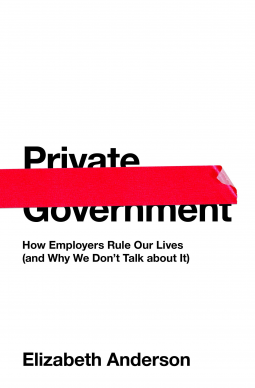
Private Government
How Employers Rule Our Lives (and Why We Don't Talk about It)
by Elizabeth Anderson
This title was previously available on NetGalley and is now archived.
Send NetGalley books directly to your Kindle or Kindle app
1
To read on a Kindle or Kindle app, please add kindle@netgalley.com as an approved email address to receive files in your Amazon account. Click here for step-by-step instructions.
2
Also find your Kindle email address within your Amazon account, and enter it here.
Pub Date May 15 2017 | Archive Date May 02 2017
Description
One in four American workers says their workplace is a "dictatorship." Yet that number probably would be even higher if we recognized most employers for what they are—private governments with sweeping authoritarian power over our lives, on duty and off. We normally think of government as something only the state does, yet many of us are governed far more—and far more obtrusively—by the private government of the workplace. In this provocative and compelling book, Elizabeth Anderson argues that the failure to see this stems from long-standing confusions. These confusions explain why, despite all evidence to the contrary, we still talk as if free markets make workers free—and why so many employers advocate less government even while they act as dictators in their businesses.
In many workplaces, employers minutely regulate workers' speech, clothing, and manners, leaving them with little privacy and few other rights. And employers often extend their authority to workers' off-duty lives. Workers can be fired for their political speech, recreational activities, diet, and almost anything else employers care to govern. Yet we continue to talk as if early advocates of market society—from John Locke and Adam Smith to Thomas Paine and Abraham Lincoln—were right when they argued that it would free workers from oppressive authorities. That dream was shattered by the Industrial Revolution, but the myth endures.
Private Government offers a better way to talk about the workplace, opening up space for discovering how workers can enjoy real freedom.
Based on the prestigious Tanner Lectures delivered at Princeton University's Center for Human Values, Private Government is edited and introduced by Stephen Macedo and includes commentary by cultural critic David Bromwich, economist Tyler Cowen, historian Ann Hughes, and philosopher Niko Kolodny.
Advance Praise
"The extent of the arbitrary authority of owners and managers over employees is surprisingly neglected by political thinkers, given how much time we spend at work and how little in the polling booth. Elizabeth Anderson provides a much-needed, important, and compelling account of this overlooked subject. Private Government deserves to be widely read and discussed."—Alan Ryan, professor emeritus, University of Oxford
"This is a very exciting and extremely important book that presents a major challenge to philosophers and social scientists to think about the modern workplace as a form of private government. It is strange that, in a liberal society, there is so little discussion of the relations of power that characterize the workplace. Anderson deftly brings together history, economic theory, and philosophy to have just that conversation. This book unsettles some very deep, unjustifiable assumptions we have about the nature and organization of work today."—Alexander Gourevitch, Brown University
Available Editions
| ISBN | 9780691176512 |
| PRICE | 27.95 |
Average rating from 2 members
Readers who liked this book also liked:
John Kotter; Holger Rathgeber
Business, Leadership, Finance, Nonfiction (Adult)




